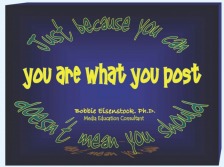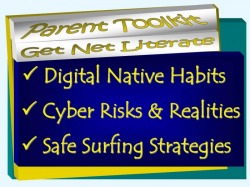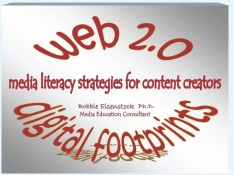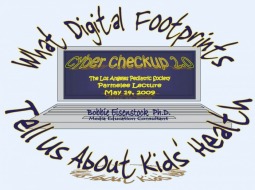|
Youth Workshops

FYI: TMI can be harmful in RL cuz U R WAT U POST.*
Cyberspace is a place where you can freely express yourself but there are no "take-backs." Everything you do or say is a mouse-click away from being viewed, saved, copied or forwarded by anyone online.
Students consider how parents, teachers, coaches, college admissions, future employers, even their own "friends" might interpret a blog entry, IM, text message, twitter, photo or video uploaded, posted and shared in cyberspace.
Participants learn the "rules of the road" to safeguard their online identity and protect their net reputation before it has unintended real-life consequences. Appropriate for elementary, middle, and high school.
*For Your Information: too much information can be harmful in real life because you are what you post
Cyberspace is a place where you can freely express yourself but there are no "take-backs." Everything you do or say is a mouse-click away from being viewed, saved, copied or forwarded by anyone online.
Students consider how parents, teachers, coaches, college admissions, future employers, even their own "friends" might interpret a blog entry, IM, text message, twitter, photo or video uploaded, posted and shared in cyberspace.
Participants learn the "rules of the road" to safeguard their online identity and protect their net reputation before it has unintended real-life consequences. Appropriate for elementary, middle, and high school.
*For Your Information: too much information can be harmful in real life because you are what you post
Parent Education

Is the media culture affecting your ability to parent? If you say yes, you are not alone. Most parents acknowledge their responsibility for keeping kids safe in cyberspace, but they feel they don't have the skills to help their kids use the Internet safely and responsibly. Parents are at a cyber disadvantage. They are Digital Immigrants raising Digital Natives who are far more savvy in the wired world.
What can parents do? Get net literate.
Cyber Parenting 2.0 workshops feature proactive parenting practices that capture teachable moments to support the values parents want their children to learn.
Parents can help their children develop the cyber advantage when they know about new opportunities for kids to express themselves, explore their interests, expand their knowledge, and develop their technical skills. Learn about Digital Native habits, cyber risks and realities, and safe surfing strategies for different family situations.
Appropriate for all levels of computer competency, from computer whiz to newbie.
What can parents do? Get net literate.
Cyber Parenting 2.0 workshops feature proactive parenting practices that capture teachable moments to support the values parents want their children to learn.
Parents can help their children develop the cyber advantage when they know about new opportunities for kids to express themselves, explore their interests, expand their knowledge, and develop their technical skills. Learn about Digital Native habits, cyber risks and realities, and safe surfing strategies for different family situations.
Appropriate for all levels of computer competency, from computer whiz to newbie.
School In-Service Trainings

Do you know what your students do online? Research tells us that most kids are socializing with friends and honing their technical skills. Some are exploring interests and learning information beyond the classroom. Still others are putting themselves at risk by sending mean and hurtful IM and text messages, forwarding sexually explicit photos of themselves from their cell phones, and posting too much personal information in cyberspace that can come back to haunt them later.
Kids have been. . .
- expelled from school for cyberbullying
- denied acceptance to college for improper online behavior
- arrested for threatening classmates or posting explicit photos of underage friends
- charged with distributing child porn or being a sex offender for sexting
What can educators do to help students protect their digital footprints from unintended consequences? Teach students media literacy strategies to think critically about what they see, hear and read online as well as what they create, post and share in cyberspace. Children and adolescents who are media literate become empowered as lifelong learners in the Digital Age.
This session trains teachers in the competencies that students need to access, analyze, evaluate, and create messages and images in all forms of digital and print communication. Using media literacy education as a framework and pedagogy, teachers learn strategies to help students become media literate with technology. According to The Partnership for 21st Century Skills, information literacy, media literacy, and technology are key "skills, knowledge, and expertise students should master to succeed in work and life in the 21st century." Appropriate for K-12 teachers and school administrators.
Kids have been. . .
- expelled from school for cyberbullying
- denied acceptance to college for improper online behavior
- arrested for threatening classmates or posting explicit photos of underage friends
- charged with distributing child porn or being a sex offender for sexting
What can educators do to help students protect their digital footprints from unintended consequences? Teach students media literacy strategies to think critically about what they see, hear and read online as well as what they create, post and share in cyberspace. Children and adolescents who are media literate become empowered as lifelong learners in the Digital Age.
This session trains teachers in the competencies that students need to access, analyze, evaluate, and create messages and images in all forms of digital and print communication. Using media literacy education as a framework and pedagogy, teachers learn strategies to help students become media literate with technology. According to The Partnership for 21st Century Skills, information literacy, media literacy, and technology are key "skills, knowledge, and expertise students should master to succeed in work and life in the 21st century." Appropriate for K-12 teachers and school administrators.
Professional Development Trainings, Workshops and Meetings

Do you IM or text message? Do you twitter your status at least once a day? How many people have you "friended" on Facebook or MySpace? Do you know them all personally? What did you upload or watch on YouTube today? Have you been tagged with an embarrassing photo? You may not do these things, but kids you know do.
New media technology is transforming how kids spend their time, where they hang out, and the ways in which they communicate and access information. The Web has changed not only how kids learn, play and socialize, but how parents raise children, educators teach students, health practitioners advise about kids' health, and youth advocates outreach to children and teens.
No matter how you interact with the Digital Generation, this professional development session can help you get up to speed on what kids know and where they go online. Find out how the online culture has become the 24/7 virtual extension of the youth culture. Topics are custom-tailored for your specialized youth connection and type of learning experience.
New media technology is transforming how kids spend their time, where they hang out, and the ways in which they communicate and access information. The Web has changed not only how kids learn, play and socialize, but how parents raise children, educators teach students, health practitioners advise about kids' health, and youth advocates outreach to children and teens.
No matter how you interact with the Digital Generation, this professional development session can help you get up to speed on what kids know and where they go online. Find out how the online culture has become the 24/7 virtual extension of the youth culture. Topics are custom-tailored for your specialized youth connection and type of learning experience.
Keynotes, Panels, and Roundtables
Depending on the educational goal of your group or organization, a keynote speech, seminar, roundtable,
or panel presentation can be effective ways to provide insight into new media and the Digital Generation:
Keynote speeches raise awareness about critical issues
Panel presentations provide different perspectives
Seminars allow for in-depth discussion
Roundtables offer opportunities for collaborative exchange of ideas, information and resources
Ask me about keynotes, moderating a panel, or facilitating a seminar or roundtable for your group